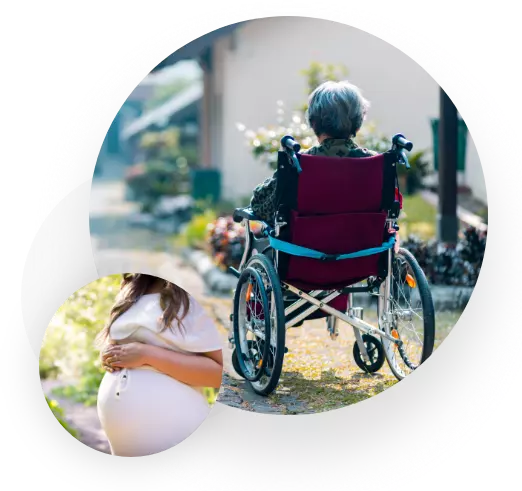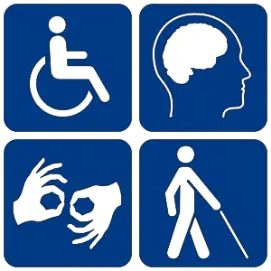Disability & Pregnancy Discrimination
Disability discrimination and pregnancy discrimination are illegal in the workplace. California has some of the strongest disability discrimination and pregnancy discrimination protections in the United States. If you think you have experienced pregnancy or disability discrimination at work, contact our San Francisco, Oakland, or Marin offices to schedule a consultation.
A confidential consultation with experienced discrimination attorneys and legal professionals is the best first step towards protecting your rights at work.


What is a Disability?
Disabilities include any physical or mental health condition that impacts your ability to perform a major life activity. Major life activities include things like working, walking, seeing, breathing, and eating. This definition is very broad and includes most types of mental or physical illness.
Disabilities are generally long-term health conditions, though they don’t have to be permanent. Short illnesses, like common colds, are not disabilities.
Discrimination Happens When Pregnant and Disabled Workers Aren’t Treated Fairly
Disability and pregnancy discrimination occurs when an employer treats employees unfairly because they are disabled or pregnant. This includes refusing to hire, promote, train, or accommodate disabled or pregnant employees.
If you have experienced discrimination at work because you are disabled or pregnant, contact us to schedule a free consultation.
Employers Must Accommodate Pregnant and Disabled Employees
If an employee is disabled or pregnant, their employer must provide reasonable accommodations. Reasonable accommodations are the tools and assistance disabled and pregnant employees need to succeed at their jobs. Employers must accommodate employees, unless the accommodations would be unreasonably burdensome to the employer’s business.
Accommodations can take many forms, like providing ergonomic tools, transferring a pregnant employee to a less strenuous position, offering a modified work schedule, or giving time off from work.
Your Employer Must Participate in the Interactive Process
Accommodations are not “one size fits all.” To identify the best accommodation for your unique situation, your employer must engage in a timely, good-faith interactive process to identify a reasonable accommodation that allows pregnant and disabled employees to do their jobs. Your employer must start this process as soon as it learns you are disabled or pregnant and need an accommodation.
You do not have to provide your medical records or share your diagnosis to get a reasonable accommodation at work. You do need to answer basic questions from your employer, like what types of activities you can’t do at work and how long you will need the accommodation. You may also need to provide a note from your doctor.

Your Employer Cannot Retaliate Against You for Requesting Accommodations
In California, it’s illegal to retaliate against pregnant and disabled employees who ask for reasonable accommodations at work. This means your employer cannot fire you, write you up, or demote you because you took leave or asked for accommodations.
If your employer has refused to accommodate you or retaliated against you for seeking a reasonable accommodation, contact us today to see if you have a case. Our disability discrimination lawyers and legal staff are here to help.
You Have a Right to Take Medical Leave
Medical leave is one of the most common reasonable accommodations. State and federal law protects your right to take medical leave from work. Under the California Family Rights Act (CFRA) and federal Family and Medical Leave Act (FMLA), you have a right to take up to 12 weeks of medical leave. You do not have to take all 12 weeks of leave at once.
From offices in San Francisco, Oakland, and Marin County, our attorneys protect employees who do the right thing. We represent whistleblowers in the San Francisco Bay Area and throughout California who have been terminated or otherwise mistreated in retaliation for reporting employer wrongdoing. Our results don’t lie.
There are three requirements for employees who want to take leave under FMLA or CFRA:
- Work for your employer for at least one year
- Work a minimum of 1,250 hours in the previous 12 months (about 24 hours a week)
- FMLA: Your employer has 50 or more employees
- CFRA: Your employer has 5 or more employees
You may have a right to take additional leave after exhausting your FMLA or CFRA leave. If you ask for more time off, your employer must engage in the interactive process to determine if more leave is a reasonable accommodation.
You Have a Right to Take Pregnancy Leave
When you are pregnant, you have a right to take time off under California’s Pregnancy Disability Leave Law (“PDLL”) The PDLL applies to all California employers with five or more employees. You are eligible for PDLL leave as soon as you get hired. You can take up to four months of PDLL leave.
You Have a Right to Take “Baby Bonding” Leave
Under the CFRA, both pregnant people and their partners or spouses have a right to take up to 12 weeks of leave to bond with their new child after its birth. You can take baby bonding leave at any time within 12 months of the birth. The birth parent has a right to take up to 16 weeks of PDLL leave and another 12 weeks of CFRA baby bonding leave after their child is born.
Adoptive and foster parents also have the right to take up to 12 weeks of CFRA bonding leave after the adoption or foster placement of their child.
You Also Have a Right to Take Leave to Care for a Sick Family Member
If your immediate family member is disabled, sick, or pregnant, you also have a right to take leave. The CFRA and FMLA grant employees up to 12 weeks of leave to care for their children, parents, spouses, domestic partners, and parents-in-law.
The Law Protects Your Right to Take Leave
Under the CFRA, FMLA, and PDLL, your right to take leave is protected. It’s illegal for your employer to punish you for taking leave, discourage you from taking leave, or interfering with your leave.
Your employer must hold your job open until you return from leave, unless holding your job would be an undue burden. If your employer cannot reinstate you to your old job, they must give you a comparable position with a similar salary and benefits. When your employer calculates seniority, they cannot count PDLL leave as a “break” in your work.
Has your employer punished you for requesting or taking medical leave? Contact us to schedule your free consultation.

You Have the Right to Take Breaks for Lactation
After giving birth, you may need to express breast milk at work. Under California law, your employer must give you a reasonable amount of break time to pump breast milk. Your employer must allow you to pump whenever you need, but they may ask that you use break time to pump.
You Have the Right to a Safe, Private Space to Pump
Your employer must provide a safe and private space for you to pump breast milk at work. The space must be private while you are expressing milk; be safe and clean; have a counter or table for your pump and other items; have a place to sit; and have electrical outlets or charging stations. If the space is a multipurpose room, your right to pump in a private space takes priority. The space cannot be a bathroom, and it should be close to your work space.
If your employer knows you are lactating, they must also provide access to a sink and a fridge to store breast milk. If there’s no room for a fridge, your employer must give you an alternative like a cooler.
All employers with 50 or more workers must meet these requirements. If your employer has 50 or fewer employees, they may not have to provide a lactation room if it would pose an undue hardship. However, all California employers should have a written lactation policy.
Harassment is Offensive or Abusive Workplace Conduct
For many pregnant and disabled employees, harassment is all too familiar. Harassment occurs when an employee or supervisor engages in conduct that is offensive or abusive towards disabled or pregnant employees, because they are disabled or pregnant. The conduct must be so severe and pervasive that it creates a work environment that is hostile, intimidating, offensive, oppressive, or abusive.
Harassment Includes a Wide Range of Conduct
Disability and pregnancy harassment includes many kinds of offensive and hurtful conduct. It can be verbal, physical, or visual. Harassment includes derogatory remarks about a person’s pregnancy, slurs towards disabled people, and physical conduct that a reasonable disabled or pregnant person would find threatening or humiliating.
Employers Must Stop Harassment
If an employer knows that a pregnant or disabled employee is being harassed, they must take all reasonable steps to stop it. Failing to stop harassment is illegal in California. If you complained to your employer about harassment and they won’t help, you may have a case.
Contact us, our legal staff is available for a free consultation.
